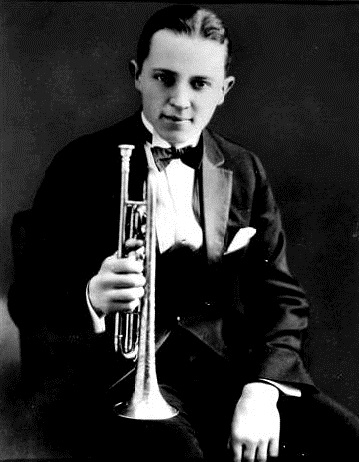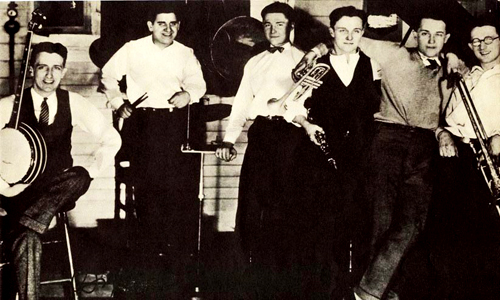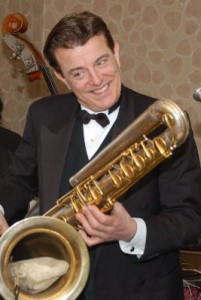
Bix Beiderbecke. Photo in public domain.
On the radio this week Riverwalk Jazz explores cornetist Bix Beiderbecke's gift for music and his place in jazz history. One of the first major soloists to emerge in jazz, Beiderbecke is considered by many to be the first to conceive of the 'jazz ballad' as a musical form.
Jazz today is considered high art but in the early 1920s most Americans thought the noisy, raucous jazz bands of the day were an ephemeral novelty or vaudeville entertainment not to be taken seriously. The first hit jazz record in history, the Original Dixieland Jazz Band's 1917 show piece "Livery Stable Blues," featured brass instruments making bleating and braying barnyard animal sounds, reflecting deep roots in the comedic vaudeville tradition.
On the other hand Bix Beiderbecke and his contemporary, Louis Armstrong took their music seriously and were constantly exploring new musical ideas. Armstrong was an early admirer of Bix, calling him a "natural born genius."
Even as a child Bix Beiderbecke displayed an amazing ear for music. His kindergarten teacher recalled that after singing a song just once with his classmates, Bix could pick out the exact notes on the piano. A couple decades later Jack Teagarden remarked, "Bix would hear something once and he would have it. He could pick up intricate modulations and tricky arrangements in just one hearing."

Bix and his Rhythm Jugglers in 1925. Left to right: Howdy Quicksell, Tom Gargano, Paul Mertz, Don Murray, Bix Beiderbecke, Tommy Dorsey. Courtesy Red Hot Jazz Archive.
1924 was a big year for Bix Beiderbecke. He went from being the star of a small town band to holding down the 'jazz trumpet chair' in one of the most popular dance bands in the country. Bandleader Jean Goldkette called himself the "Paul Whiteman of Detroit," referring to the most popular bandleader and highest-grossing attraction in 1920s' pop music. Goldkette's home base was in Detroit but he managed several bands around the country including the one Bix joined.
In the mid-20s Bix was doing well professionally. He had a steady gig with Goldkette, but his true passion was making pure jazz in small groups with his friends. Recording under names like Bix and His Rhythm Jugglers or Bix and His Gang he displayed his skill as a soloist on corny pop tunes like "Barnacle Bill," slow blues like "Toddlin' Blues" and elegant Bill Challis arrangements such as "Three Blind Mice."
Bix's reliance on his phenomenal gift for memorization was an obstacle to his learning to read music. His lack of reading skill had delayed his being hired by the Paul Whiteman Orchestra. But once a member of Whiteman's band, other members, especially arranger Bill Challis, made wide allowances for Bix's limitations. They realized that his contribution to the sound of the Whiteman and Goldkette bands was key.
Challis built hot arrangements around Bix's improvisations. Jim Cullum says, "He could make the whole Whiteman Orchestra just get up and take off and swing all by himself. Bix's music was never about overwhelming virtuosity. It was just from the heart, and he was really swinging."
The influence of this new 'hot' sound was widely felt in the 20s and 30s and still casts a long shadow today.
Jazz historian, bandleader and bass saxophonist Vince Giordano (left) joins The Jim Cullum Jazz Band to play rare gems from Bix Beiderbecke's repertoire.
Giordano is one of today's foremost interpreters of Bix's musical legacy and the leader of his Nighthawks Orchestra in New York City.
Photo credit for Home Page: Bix Beiderbecke. Photo in public domain.
Text based on Riverwalk Jazz script by Margaret Moos Pick © 2011


